Peter MALONE
Saturday, 18 September 2021 19:49
Naked and the Dead, The
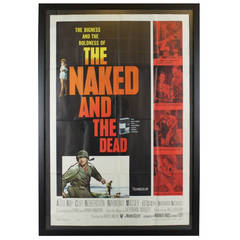
THE NAKED AND THE DEAD
US, 1958, 132 minutes, Colour.
Aldo Ray, Cliff Robertson, Raymond Massey, Richard Jaeckel, Jerry Paris, William Campbell, Joey Bishop, James Best, L.Q.Jones, Barbara Nichols.
Directed by Roland Walsh.
The Naked and the Dead is based on the celebrated World War II novel by Norman Mailer. Mailer continued to have a significant career in succeeding decades with novels, biographies and studies of important Americans like Marilyn Monroe.
The novels by James Jones, From Here to Eternity and The Thin Red Line, and their film versions, had made a great impact on the American reading public, giving them pictures of war which were both down-to-earth, in military behaviour and relationships in Honolulu before going into action as well as meditative reflections on the meaning of war. The Naked and the Dead is in this vein.
The cast was not as high profile as in From Here to Eternity. Aldo Ray had a solid film career and was impressive as the repellent Croft in this film, racist, vicious towards women, ruthless in his leading of men, executing of Japanese soldiers, jealous towards his leader. On the other hand, Cliff Robertson as the voice of reason was at the beginning of his career and was to win an Oscar 10 years later for Charley. The other central character, the obsessive general, is played by veteran Raymond Massey, Things to Come, portraying Lincoln in and starring in East of Eden with James Dean.
The group of soldiers was played by a number of solid American character actors.
Raoul Walsh had been making films since 1913, even with Pancho Villa. He had a long and successful career, mainly directing action pictures, many of them at Warner Brothers with such stars as Humphrey Bogart. This was to be one of his final films.
1. World War II film? A film of the 1950s? Close to the experiences shown?
2. The work of James Jones and Norman Mailer, novelists of the 50s, their novels, the movies made of their novels, the interest of the public? The perceptions of war? Questioning the reasons for war? The nature of warfare and authority?
3. Norman Mailer and his career, reputation, the status of his novel, the transfer to the screen, the criticisms of its inadequacy compared with the book?
4. A big production, widescreen? The cast, the veteran director, the Panama locations for the South Pacific? Bernard Herrmann’s score?
5. The title, the military?
6. The action sequences, compared with the sequences of this period? The soldiers, the boats, infantry, under fire, the taking of hills, assaults, the use of grenades, guns? Injuries and death?
7. The philosophical discussions? The general and the discussions of power, fear, exercise of power? Authority? Power in war? The reasons? the reflections on soldiers, their service, patriotism, giving their lives? Power and the obsessive behaviour of both Croft and the general?
8. The introduction, Honolulu, the club, the soldiers, the strippers, the MPs, relationships between the soldiers and the locals?
9. The introduction to Croft, tough, in the bar, hitting the women, spitting the drink in the face of the bartender, with his men? Indication of things to come? His prejudices? The new men? Demanding that they stand to talk with him? The flashback, his relationship with the woman, her infidelity, his anger and motivation?
10. The introduction of the Jewish characters, the expressions of anti-Semitism? Later on the hill and the anti-Semitic taunt?
11. The general, as a character, the briefings, order in his room, a career military man, his strategies, admiration for the enemy and strategies? Choosing Robert as his aide, his intentions, the discussions, treatment of him, and being demanding? Wanting everything cleaned? The flowers on his desk? The issue of the cigarette butt on the floor? His speeches? His phone demands, sending Robert on the mission as punishment, the meeting, his strategy, being proven wrong? His return, the attack on his official and the initiative? The breakthrough? Talking with the wounded Robert, Robert and the discussions about power, and still disagreeing with the general?
12. Robert, military career, his father, as the general’s aide, with the men, getting the documents from the dead Japanese from Croft? Croft wanting some kind of repayment and his refusal? With the general, the arguments, his different stances on power and fear? Going on the mission, command, Croft not liking it, the attack, his being wounded, carried, wanting water, saved, his gratitude?
13. Croft, the mission, his courage, leadership, being friendly to the captured Japanese, the photo of the family, the cigarette and then killing him? Getting gold from the Japanese dead and their teeth? Orders? Gallagher and his challenging him? Going on the mission, his motivation, the anti-Semitic taunt and the soldier falling? Martinez, the deceit about the Japanese presence? climbing? Indicating that Robert should die? His going out to the field, with all the Japanese, his death?
14. The range of men, Wilson in Honolulu, Gallagher and his newborn son, Red and his defiance of Croft, the Jewish soldiers, carrying Robert back, the Baptist minister and talk of God?
15. A war film of the 1950s – how does it stand up in retrospect?
Published in Movie Reviews
Published in
Movie Reviews
Tagged under
Saturday, 18 September 2021 19:49
Jack Irish: Dead Point
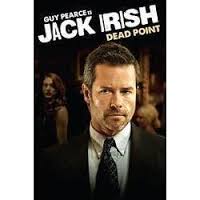
JACK IRISH: DEAD POINT
Australia, 2014, 85 minutes, Colour.
Guy Pearce, Barry Humphries, Marta Düsseldorp, Aaron Pedersen, Roy Billing, Deborah Mailman, John Jarrett, Vince Colosimo, Kat Stewart, Shane Jacobson, John Flaus, Damian Harvey, Terry Norris, Ron Falk, Tina Bursill.
Directed by Jeffrey Walker.
Peter Temple is one of Australia’s leading crime writers. One his best novels, The Broken Shore, was filmed by ABC television with great success. The ABC also participated in the production of three television movies based on Temple’s series with former lawyer, Jack Irish. The first two were screened in 2012, Black Tide, Bad Debts. This third in the series, Dead Point, screened in 2014. The three films were directed by Jeffrey Walker.
Guy Pearce is exactly right for Jack Irish. Peter Temple said that he had not imagined Jack Irish like Guy Pearce but on seeing the films, he was fully persuaded. Pearce brings Irish fully to life, his grief at the murder of his wife, his giving up the law, his becoming involved in investigations, sometimes seedy look, semi-shaven, old clothes. However, he has a sharp mind and is able to solve crimes and mysteries.
The films also boast strong casts, some of Australia’s best actors in each of the films. Martha Dusseldorp (star of the Black Jack series with Colin Friels, star of Janet King) is an on-and-of love, an ambitious journalist, with a talkback radio program. She is smart and discovers the key clue to the resolution of the mystery.
In each of the films Jack Irish pals up with two friends involved in the racing business. They are played genially by Roy Billing and in a tough manner by Aaron Peterson. This time their racing interests connect with an aboriginal councillor played by Deborah Mailman.
However, the main focus is on the stevedoring industry and the Melbourne docks, the ruthless bosses, drug smuggling and murder. Vince Colosimo is convincing as the thuggish boss. Kat Stewart is his wife who runs an exclusive, if decadent club, for politicians and highflyers in Melbourne society.
The surprise of the film is the presence of Barry Humphries as a judge who has made a judicial investigation into the waterfront and is about to present his report. However, he has tangled with a young man who has incriminating photographs in a book which has disappeared – and could be an instrument for blackmail, not only of the judge, but of another politician also involved in the investigation (Kate Beahan).
Barry Humphries, almost 80, gives a performance that is the exact opposite of Dame Edna Everage or Sir Les Patterson, more like his off-screen, radio persona, quietly spoken, cultured. It gives a great strength to the film.
1. The novels of Peter Temple? The Victorian settings, Melbourne, the police, the world of crime, politics, corruption?
2. The film versions of temples novels? Guy Pearce as Jack Irish? Age, character, past experience, marriage, the murder of his wife, his grief and having nightmares? His relationships? Friends? The racing friends, his family, the investigators, the police, the chorus at the pub?
3. The title, the ending, the climax, on the Victorian coast?
4. The use of Melbourne, the detail of the streets, the overviews, Fitzroy, Irish’s home, the local pub, the secret club, the church, the Melbourne docks? The musical score?
5. Guy Pearce and his screen presence, Irish’s personality, the law, going out of the law, his range of contacts, discussions with Barry and information, Harry and Cam, the racing sequences, and Cam handy with protection and fists?
6. The Melbourne docks, the police corruption, the car with the drugs, the stealing of the drugs, the death and its being faked, the documentation? The motivation?
7. The opening, Sienna, her relationship with Rob, his being absent, her looking at his book, the photos? Her work at the club, the meetings with Jack, the information, the cameras photographing it? Meeting Jack at the pub? Future information, her death? her body in the boot of Jack’s car, his being framed?
8. Linda, the past relationship with Jack, her work on the radio, talkback, the politician and the judicial enquiry, the questions and her walking out? Jack and his funny voices, her knowing that it was Jack? Her relationship with Jack, resuming? Wanting a scoop? Living with Jack, the sexual relationship? Her knowing the past? Her watching the video, recognising the lighthouse? Present at the end, phoning Jack, the judge coming to present the report?
9. The chorus of the pub mates, in each of the films, their comments, the football, at the match, barracking, the post-mortem? Stan, his wanting to go upmarket with his menus and his machines?
10. Harry and Cam, the visit, the proposition, going to see Cynthia, the aboriginal background, her house, the kids, the mess? Her good tip? Going to the racecourse? The people delivering the cash after the win? Harry and Cam watching on television? The attack on the tunnel, her being robbed, injured? Artie and Lizard, being identified? Marie, taking the drugs, her telling the truth? Jack and Cam visiting Artie, pouring the stuff on him in the car, Lizard telling the truth and giving back the money? The visit to Cynthia in hospital, her getting back home?
11. The judge, Jack’s father-in-law? His grief at his daughter’s death? Elle, the baby, the invitation to Jack to come to the christening, giving her the name, Isabelle? Jack meeting the judge in the church, the discussions, the judge explaining his indiscretion, his urges and giving in? His needing the book? His relationship with Robbie, giving him the camera? The enquiry, the fears the his family, their being hurt by the revelations, becoming desperate? At the christening, at home alone, the phone call to Jack, depending on him? His decision – and his coming in to give the report?
12. Barry, a slob, enjoying eating, at the pub, giving Jack the information, searching it out? the corrupt policeman? Jack giving the information? Jack in jail after the framing, the contacts, getting free? The arrest of the corrupt policeman?
13. The club, the clients, affluent, decadent, Ros and her running the club, Sienna as one of the girls, Ros offering to help?
14. Mike, at the wharves, the talk with Jack, the threat of the container falling?
15. Jack, going to the lighthouse, phoning Susan and Rob, her behaviour in the video, her resignation from the enquiry, the truth, falling in love? The helicopter, Mike and Ros, the shooting Susan and Robbie? Jack being shot, getting the car, getting the book, crashing into the helicopter?
16. The resolution? The enquiry? The background of enquiries into docks and unions and management, drugs and corruption?
17. A well-made television movie, interesting and entertaining? Australian?
Published in Movie Reviews
Published in
Movie Reviews
Tagged under
Saturday, 18 September 2021 19:49
Miniscule: The Valley of the Lost Ants
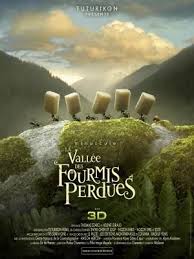
MINISCULE: THE VALLEY OF THE LOST ANTS.
France, 2013, 89 minutes, Colour.
Directed by Helene Giraud, Thomas Szabo.
This is a pleasing film, mainly for little children, and for their parents accompanying them who would be able to explain some of the details about insects.
It is also an example of French animation, based on the television series of 2006, Miniscule. The animation is fairly straightforward, but very attractive. Much is made of the beautiful French countryside, the mountains, the grass on the hills, the trees and woods, the roads through the mountains. It is only at the beginning that any humans appear, a husband and wife having a picnic on the grass, she heavily pregnant. During the meal, labour pains come on and they have to hurry away in their car, leaving some of the picnic goods on the blanket on the grass.
In the meantime, we are treated to the birth of little ladybirds, their parents looking on, helping them to flex their wings and then urging them on to fly. One of the ladybirds becomes one of the main characters for this film.
With the food left of the blanket, especially a box of sugar cubes, it is a signal for the insects to come out. On the good side, are the black ants. The film, like a documentary, shows great deal about the ants, their size, the hierarchy and command, the ants working as a group, in unison, scenes of their marching, going over the ground, finding the sugar, the attempts to carry it and take it back to their nest. The plot shows the ladybird becoming friendly with one of the ants.
On the villainous are the red ants. Once again, the film shows them in great detail, their nest, their working together, their leadership, the approach to the sugar. The film builds up to a clash, but the Ladybird and the little black and are able to thwart the ambitions of the red ants.
This is the kind of story and documentary that nature channels show on television. And, the real thing is probably more persuasive than an animation story. However, for little children, the animation and the story will capture their imagination and help them in their discovery of the world of insects and their place in the world of nature.
Published in Movie Reviews
Published in
Movie Reviews
Tagged under
Saturday, 18 September 2021 19:49
Raid 2, The
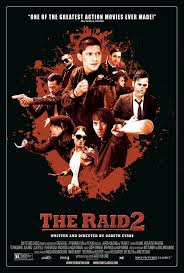
THE RAID 2
Indonesia, 2013, 148 minutes,Colour.
Iko Uweis.
Directed by Gareth Evans.
The Raid was an extraordinary box office success right around the world. Director, Gareth Evans, had moved to Indonesia and begun making feature films. With The Raid, he put the Indonesian film industry on the map. Which meant that the sequel was inevitable. Here it is.
The hero of the original film, Rama (Iko Uweis) is a martial arts champion, discovered by the director and used as the protagonist of his film as well is of this sequel. Iko Uweis also appeared in Keanu Reeves’ martial arts film, The Man of Tai Chi.
The first film was strongly focused, most of the action taking place in the one building after the police squads arrived and moved throughout the building to confront thugs and gangsters. The screenplay offered a great number of opportunities for frequent fights. Sometimes the violence of the action was marked by many touches of brutality. This made the film offputting for some audiences.
This film opens on the same day as the first film ends, with the prologue showing an execution in the countryside and indication that gang warfare was building up. The chief of the operation chooses Rama to go undercover and infiltrate the major gang. Worried about the security of his wife and family, Rama nevertheless obeys orders, is convicted of a crime, goes to prison where he encounters the son of the gang boss.
The Raid 2 is reminiscent of themes of The Godfather films as well as of stories of agents going undercover, like Donnie Brasco.
When Rama is released, he is given a job by the Indonesian Godfather and has to keep an eye on the man’s son who is reckless and ambitious, wanting to take over from his father, in league with leaders of other gangs, antagonising Japanese gangs in the country.
While the plot outline is familiar enough, Rama is quite an interesting character, taking the opportunity, almost every 15 minutes in this 2 ½ hour film, to get involved in a tough fight, sometimes one-on-one, sometimes demolishing a whole gang. Various assassins turn up, an old assassin-retainer of the gang and a hammer-wilding blind woman. The Godfather plot is also interesting, the head of the Indonesian Mafia-type family being urbane and suave, in control for 30 years, yet absolutely ruthless.
The film highlights the danger for Rama undercover, his need to check on the security of his family, his contacts with the chief who generally leaves him on his own.
In the climax, the son and the leader of a rival gang as well as a politician who is dining with them bargaining to get athe bigger payoff, feel secure from any attack. They have underestimated Rama who, though wounded, is able to get through a gang of thugs as well as the son’s main hired assassin and there is, as might be expected, slaughter all-round before the happy ending and the need for The Raid 3.
1. The impact of the original film? Worldwide? Popularity for a sequel?
2. The initial film’s reputation as an action film, martial arts, stud work? Violence?
3. An Indonesian film, British director, the flavour of Indonesia, the cities, crime, the police?
4. The sets, police precincts, prisons, gangsters’ offices, restaurants? The rousing score?
5. The impact of the action, the stud work, fights every 15 minutes also?
6. The prophet of the police, corruption within the police, officials and their connections with gangsters, payments, deals with gangsters? Honest police wanting to root out the corruption?
7. The opening, the execution in the countryside? Indication of the gang warfare?
8. Rama, his role in the first film, police work, action? the chief choosing him to go undercover? His wife, child, his continued concern for their security?
9. The chief, keeping in touch with Rama, control? His phone calls?
10. The plan, his crime, going underground, in the prison, the details of life in prison? Bangun and his son, the son in prison, his crime, throwing his weight
around, influence?
11. Getting out of jail, the offer of the job, the interview with Bangun, Rama being stripped, his clothes searched, his gaining approval?
12. Bangun and his trust, the lavish apartment, the assistants to Bangun, suave officials? The irony of the man undercover as well, whether he had been
corrupted or not?
13. Rama, accompanying the son, his contacts? The father, as an Indonesian godfather, 30 years, extensive control, suave in manner, clothes, his empire? The son and his impetuousness, wanting to take over?
14. The rival head of the gang, approaching the son, the plans?
15. The old assassin, 15 years, devoted to the boss, giving his wife cash, her not wanting to see him? His assassinations, his being stalked, murdered?
16. The feud, the meeting between the gangs, the son killing his father, his father’s shock?
17. The Japanese gang, reactions, attempts to deal with the boss, insulted by the son?
18. Rama, his work, protection, advice, the fights?
19. The final meeting, the son and the rival boss, the discussions and plans, the guards the fights, the murderous guard and the long fight with Rama, his being wounded, fighting nonetheless?
20. The son and his death, the rival at his death? The death of the police official on the take, while trying to deal with both gangs and get more money?
21. Rama, emerging as a hero – and the necessity for a sequel?
Published in Movie Reviews
Published in
Movie Reviews
Tagged under
Saturday, 18 September 2021 19:49
Parachute Battalion
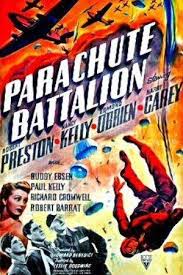
PARACHUTE BATTALION
US, 1941, 75 minutes, Black and white.
Robert Preston, Edmond O’ Brien, Buddy Ebsen, Harry Carey, Nancy Kelly, Paul Kelly, Richard Cromwell, Robert Barrat.
Directed by Lesley Goodwins.
Parachute Battalion was produced in 1941 and released later that year, some months before the attack on Pearl Harbor. The war in Europe had been waging for two years already. This film shows the military concerns of the United States at this time.
The film is more interesting and entertaining than might have been expected. It shows the Parachute Battalion, the choice of men, the details of the training, the workings of the parachutes, the jumps, the apprehensions. To this extent the film served as a recruiting poster in its time.
The film has the advantage of the strong cast led by Robert Preston in his debonair, ladies’ man type of role. The serious role is reserved for Edmund O’ Brien. The third in the trio of recruits is Buddy Ebsen as a backwoods man, but drawing on his talent for dancing, as seen in many musicals, in a routine in the men’s quarters. Harry Carey is very genial as the veteran and champion of World War I, the trainer of the men. Paul Kelly is the sergeant in charge. Nancy Kelly is the daughter of the veteran and the romantic interest. Richard Cromwell is the fearful coward. Robert Barrat as the chief also featured in The Life of Emile Zola as the traitor Esterhazy.
While the film is very much of its time, it is interesting to go back to the atmosphere of 1941, especially the military preparations which would be used in World War II.
1. The impact of the film in its time, the military traditions after World War I, during the 1930s, preparations for war, military planning? The Parachute Battalion?
2. The brief running time, the strong cast, the writing, the action sequences? Musical score?
3. The title, the focus on the group? The introduction to the three young men, Don and his being the All-American?, sports, engaged two women, his father’s exasperation, his solution to the wedding situation by joining the military? Bill, serious, joining up, his getting drunk, his relationship with his father, his poor self-image? The contrast with Jeff, at home, his parents, the farm, in the hills? The family feud with the Collins family?
4. On the train, Jeff losing his shoe, Don trying to locate the owner, encountering Kit, her father, Bill and Jeff joining him, their flirting, the father’s reaction?
5. Arrival, uniforms, big boots for Jeff, assembly, the shock at seeing Kit’s father? The dormitory, bunks? Digging the pit? Spence and his antagonism?
6. The details of the training, the explanations about how parachutes worked, the second parachute? Folding the parachutes? The need for being exact? The demonstrations? The dummy falling from the plane, crashing, Bill and his not packing correctly?
7. Time off, the meetings with Kit, Don and his attraction, charm? Bill, earnest, in love with Kit? Kit’s father favouring him? The date, the dancing? Don and his pretending to be searching for the address, the encounters with Kit’s father?
8. The build-up to the first jump, nervousness, Don’s success? Spence and his fears, confiding in Bill, wanting the extra pay, pulling the gun, the confrontation, Bill getting the gun from him? Bill wanting the transfer, the letter, his decision to jump? Success?
9. The chief, the fact that Bill was his son, memories with Thunderhead, his name? Bill being treated in ordinary fashion, eventually meeting his father, his wanting to pull out?
10. The men and their acclaim for Bill and his courage? The parachute jump, with Thunderhead, in the water, the rescue, Thunder head in hospital, pretending, proud of his men, Bill’s visit?
11. Bill and Don, the rivalry over Kit, the fight? The special flight, Don getting caught on the wing, Bill rescuing him, their fall together?
12. The awards, Bill and his father, pride? Meeting Kit, Thunderhead approving, and Don following another girl?
13. Popular ingredients at the time, serious, comic touches, romance? And US propaganda?
Published in Movie Reviews
Published in
Movie Reviews
Tagged under
Saturday, 18 September 2021 19:49
Bounce
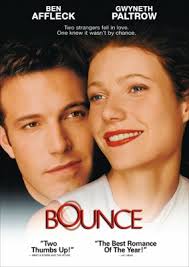
BOUNCE
US, 2000, 108 minutes, Colour.
Ben Affleck,Gwyneth Paltrow, Joe Morton, Tony Goldwyn, Jennifer Grey, Caroline Aaron, David Dorfman, Alex D. Linz., Johnny Galecki.
Directed by Don Roos.
They still make romantic dramas. Advertising executive Ben Affleck is stranded in Chicago by snow, then gives up his ticket to a chance acquaintance. When the plane crashes, he is riddled with guilt and goes on alcoholic binges. Later, he tracks down the widow, wanting to give her some business to help her with her family.
Yes, you've guessed what happens (more or less). If only men would tell the truth straightaway, life's dramas would be different and less hurtful. The widow is played by Gwyneth Paltrow, so this is a classy, if familiar, new-fashioned old-fashioned romance.
1. An old style romance? 21st century style? Issues, characters, situations?
2. Chicago airport, LA X, Los Angeles settings, the world of advertising, real estate, television awards, restaurants, offices? Palm Springs? The coast on the beach? Realism? The musical score?
3. The title, Abby’s mother and urging people to bounce back after grief? Easy to say, not in practice?
4. The opening at the airport, the snow, closing the airport, the single flight to Los Angeles, issues of fate, destiny, consequences and effects?
5. Buddy at the airport, his personal style, self-centred, drinking, mocking Greg and the play’s failure, in the video? With Greg, anxious, ringing home, concerned about his wife, the failure of the play? Mimi and her kindness about the play? Buddy giving him the ticket, his decision to go? The airport official, the past friendship with Buddy, letting Greg through?
6. The crash, the effect? Buddy’s arrival, with Jim, his guilt, drinking, the campaign and the meetings, the airline companiy’s apologies, stories of those who died? Buddy and his cynical attitudes? The awards, winning, his speech, drunk, behaviour? The reaction of Jim and the officials?
7. His going to Palm Springs, AA, his return, his assistant, commenting on his behaviour, work, gay? The cracks? Buddy becoming involved in work again, the campaigns?
8. Abby, worried about her husband and the plane, watching the television, with her mother, the boys? The messengers coming to the door, the news, her grief? Not accepting his death, pretending she was divorced? Referring to him as her ex and yet the loving words? Her real estate work, the office, Buddy coming to see her, their talking, his lies, the cup of coffee?
9. Buddy and he is getting her to manage the sale, the paperwork, Jim visiting the office, the deal, her ideas about payment, her gratitude?
10. Buddy, meeting Abby again, the phone calls, the dates, with the boys, their hesitation? The kiss? Going to Palm Springs, the water tunnel with the boys, bonding with them? The sexual encounter? Abby telling the truth about her marriage, love Greg? Buddy about to tell the truth but not doing it?
11. His assistant, not holding the calls, fostering the relationship?
12. The effect on Buddy, happy, not drinking?
13. Mimi’s arrival, giving the video to Abby, the effect, Buddy’s arrival, the boys and the video, Abby very angry, yet wanting him to say goodbye to the boys that they would not have another loss?
14. The trial, Jim and his persuading Buddy as to what he should say, not say? The account of the trip, the deceit, in court? Buddy changing, telling the story? Apologising? Abby watching? Her mother?
15. Abby and her concern about her relationship with Buddy, the consequence of Greg dying?
16. Buddy selling the house, the apology, Abby’s visit, asking her to help with the sale? The bond between them? Happy ending?
Published in Movie Reviews
Published in
Movie Reviews
Tagged under
Saturday, 18 September 2021 19:49
Crush/ 2013
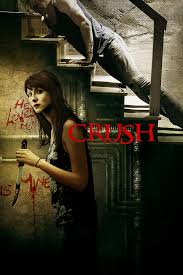
CRUSH
US, 2013, 85 minutes, Colour.
Sarah Bolger, Lucas Till, Crystal Reed, Caitriona Balfe, Leigh Whannel.
Directed by Malik Bator Bader.
Crash is an entertaining time-passer, a murder mystery where the audiences attention is directed in quite a different direction from solving the mystery.
There is a striking opening when a young girl pushes a young boy from the roof of a house. The action then moves forward several years and the audience assumes that a rather shy young girl at high school is the goal of the prologue grown up. She has a fixation on one of the top athletes in the football team and begins to stalk him.
But, the girl of the prologue is someone entirely different, the manager of a shop where the stalking girl works. There are various threats to the young man, to his girlfriend, to his friend in the football team, as well as the man who works with her at the shop. He is played by writer Leigh Whannel (writer of Saw and other horror films).
The film was targeted at a younger audience And may well reach its mark.
1. The target audience? Young adults? Older teens?
2. A stalker story, a murder mystery?
3. The town, homes, school, sport, the shops? Musical score?
4. The prologue, the boy and girl sitting on the roof, the boy and his talking, kissing the other girl, his being pushed from the roof?
5. Scott, his age, character, sport prowess, relationship with his father, his mother leaving, his injuries, the advice of his coach? His exercise and gym work? Running? His relationship with Jules? Bess and her stalking?
6. The screenplay, focusing attention on Bess, her appearance, quiet, working in the shop, getting advice from Andie, her being present at crucial situations? Scott and his warnings?
7. The shop, Andie and Dave, their work, Bess helping, normal set up?
8. The parties, the students, Bess present? The teacher and her talking with Scott? Not teaching any more? Her death?
9. The mysterious hand tripping Scott’s friend on the steps, pushing Jules over the ridge? The writing on the window? The love notes?
10. Scott, warning Bess, discussions with his father, his father not wanting to play sport? The relation with Jules, sexual? Suspicions of Bess? Jules put off, ignoring him?
11. The reality, the revelation of Andie being the stalker, the bike accident, her cutting her leg, the injury, his taking her home, in the basement, tying him up, mad? Dave arriving, her having led him on, her certainly killing him?
12. Bess, the boy who liked her, coming to the rescue?
13. Andie, in the asylum, her treatment?
14. A satisfactory mystery with stalking – and the audience being steered in the wrong direction?
Published in Movie Reviews
Published in
Movie Reviews
Tagged under
Saturday, 18 September 2021 19:49
I'll Be Seeing You/ 2004

I’LL BE SEEING YOU
US, 2002, 96 minutes, Colour.
Alison Eastwood, Bo Svenson, Margot Kidder,
Directed by Will Dixon.
I’ll Be Seeing You is a standard telemovie version of a story by Mary Higgins Clark. The central focus is a very strong woman, played by Alison Eastwood, who lives with her mother running a centre for tourists. Her father has disappeared and the insurance company will not pay on his death policy because there is no body. At a charity function, a woman behaves mysteriously which leads to her investigating a racket involving the sale of children, involving some doctors and social workers.
There is also the subplot about her missing father, revealed as having a separate family in Arizona, with Margot Kidder as his other partner. Her daughter was seeking out the other family when she was stalked and murdered.
This means another subplot with the stalker, his fascination with Alison Eastwood, infiltrating her home,ultimately abducting her.
Co-star is Bo Svenson, a friendly a family friend – but, obviously, sinister.
1. A Mary Higgins Clark story? Mystery, romance? The target audience?
2. Television movie style, for the intended audience? The touch of soap opera, romance, melodrama?
3. The locations, the town in winter, the farm, home, hospitals? The contrast with Arizona, the city, homes? The musical score?
4. The opening, Catherine and the bus, walking in the snow, the stalker, mistaken identity, her resistance, the murder?
5. Patricia and her mother, missing their dead father, lack of tourists, financial difficulties, the insurance on his policy, the lack of a body? Philip Carter, his
support and friendship, Patricia’s father’s office? Cleaning it out? Philip’s advice?
6. Going to the charity occasion, in memory of her father, meeting the woman, her fears, talking to Philip? The pregnant woman, asking for her inheritance, suspicions?
7. The foundation, the hospital, the murdered woman, as an employee, the documents, her father signing them? Patricia going to the hospital, meeting the other doctor? His telephone call? The background of intrigue?
8. The detective, discussions with Patricia, his work, interest?
9. Patricia examining the accounts, the two hundred thousand dollar cheque? The firm in Arizona? Her decision to go, discovering Frances, the fact of the other family, Catherine? Their knowing about Patricia and her mother? The effect on Patricia, the truth? The two families? The father supporting both?
Frances’ later visit and just looking and leaving?
10. The subplot, the stalker, his jobs, asking about tourism and the horse riding? going into the house? Following Patricia? Confronting her? Taking her? The rescue, just in time?
11. The truth, Philip Carter, the death of the doctor, his plans, the finance in children-dealing, his threats, his death?
12. The resolution Patricia, her mother? The role of the detective?
13. The popular ingredients with this kind of story?
Published in Movie Reviews
Published in
Movie Reviews
Tagged under
Saturday, 18 September 2021 19:49
Journey to the End of the Night
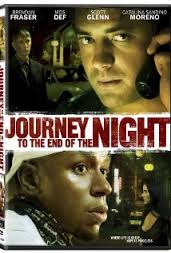
JOURNEY TO THE END OF THE NIGHT
US, 2005, 88 minutes, Colour.
Brendan Fraser, Scott Glenn, Mos Def, Catalina Sandino Moreno, Alice Braga.
Directed by Eric Eason.
Journey to the End of the Night is an odd film, set in one night in the Brazilian city of São Paulo. It is the story of an American gangster, owner of a brothel, Sinatra, played by Scott Glenn, and his son, also a gangster, Paul, played by Brendan Fraser.
It is shown in flashback that a Russian mobster is murdered in the brothel by his wife and has left a case full of drugs. Father and son have sought out a Nigerian crew on a ship to sell the drugs. When their courier dies after sexual exertion, they find a cook who speaks the language and who agrees to exchange the drugs for money. This he does but is pursued by Paul’s thugs who want to steal the money and thwart his father. There is also a crooked detective after the money as well.
Part of the complication is a young woman who encounters the Nigerian cook and shares a dangerous car chase with him. She is played by Alice Braga.
There is also a soothsayer who has foreseen Alice Braga’s death and who is then consulted by Sinatra, with Paul arranging his abduction to find out what he told his father.
And there is also Sinatra’s young wife, a former prostitute, Cataline Sandino Moreno, whom he has married but who has borne a child who is really Paul’s. She is about to leave with Paul, deceiving her husband.
A very busy night in São Paulo, showing the ugliness of the exploitative world of brothels and pimps, of drug dealing and of thugs for hire and corrupt police.
1. A 21st century film noir? A grim story? Grim tones?
2. The Brazilian setting? The city of São Paulo? The night? The brothel, the streets, the docks? The garish colours? The musical score?
3. The unsympathetic characters, their backgrounds, exploitation, greed? Violence?
4. The title, the action taking place over one night?
5. The situation, explained in the flashback, the Russian client, his wife and her gun, killing him, shooting herself? Leaving the case of drugs? Sinatra and his decision about the drugs? Paul and his attitudes? The decision to sell them? The Nigerian group, needing a go-between? Their agent, his picking up the transvestite, the sexual encounter, his death?
6. Sinatra and his character, Paul and the revelation of his father’s callous attitude towards his wife and her dying of cancer, his sexual behaviour with the nurse and ignoring his wife? Paul and his angry reaction, tears, unable to forgive his father? Paul in himself, his relationship with Anita, defying his father, deceiving him, the child? Anita as a prostitute and then Sinatra marrying her? Her not telling him that it was Paul’s child? Sinatra and his love for the child, wanting to be a father and carefully him? The plans to get away, with the money? A different life?
7. Sinatra going to the kitchen, seeing Wemba, testing him out on the language? Giving Wemba the mission? Paul and his mistrust? The irony of the detective and his associate, the prostitute giving him information, his planning to take the money? Paul and his setting up his own contact? To get the money and defy his father?
8. The old woman going to the soothsayer? His vision? Seeing her daughter’s death? Sinatra coming to see him, their discussions, the soothsayer not being able to tell Sinatra what would happen? Paul sending his thug to confront the soothsayer, find out what he told his father? Killing the man’s dog? Taking him to his father? His not getting any information, his anger?
9. Wemba, driving to the dock, with the drugs, meeting the Nigerians, going on board, the deal, demanding to see the money? The exchange? His leaving, his being pursued by the thugs, the car chase, the bike, the gate and the escape? The encounter with Monique, the dangers, his taking her with him, her fears in the car ride, her support of him? Going into the building, taking the motorbike, her being wounded, his leaving her in the street and the ambulance coming?
10. Paul, his violence towards the transvestite and the responsibility for the death of the Courier? The transvestite returning, with the gun, the wounds from Paul’s beating? The confrontation, shooting Paul and his falling out the window? His shooting the transvestite? Threatening to kill Anita, Sinatra coming in between, his being shot? Wemba arriving, Sinatra’s trust being vindicated? Urging him to take the money, save Anita and the boy?
11. The detective, his wanting the money, threatening with his gun, Sinatra shooting him?
12. Wemba, Anita and the boy, finally leaving – to what future? The irony of Wemba being a cook and his finishing the night with all the money?
Published in Movie Reviews
Published in
Movie Reviews
Tagged under
Saturday, 18 September 2021 19:49
Prosecuting Casey Anthony
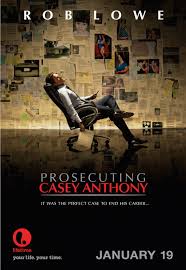
PROSECUTING CASEY ANTHONY
US, 2013, 95 minutes, Colour.
Rob Lowe, Elizabeth Mitchell, Kevin Dunn, Oscar Munoz, Marisa Ramirez, Virginia Welch.
Directed by Peter Werner.
Prosecuting Casey Anthony is based on an actual case in Florida, the death of a child in 2007 and the prosecution of the mother several years later. She was found not guilty, despite public opinion against her and protests outside the court.
This is a star vehicle Rob Lowe who served as producer of the film. He plays Jeff Ashton, working in the DA’s office in Miami, taking on one last case and expecting to win. There is a great deal of the running time of the film investigating and speculating on the killing, the mother’s 31 days before reporting the child missing, the burial of the child and the involvement of Casey’s policeman father, the role of her husband. While the prosecuting team thought the evidence was strong, it was still circumstantial. One of the surprises was Casey’s accusations against her father of sexual abuse when she was at home. This was something he vigorously denied.
As expected, a great deal of the running time is in the courtroom sequences where Ashton may have relied too much on his speculations and not anticipated the spirited defence, shrewd, accusatory.
Oscar Nunez is very good as the defence attorney, Elizabeth Mitchell as Linda, associate of Jeff Ashton. Kevin Dunn is Casey’s father.
While American audiences may be very familiar with the case, it is completely new to most audiences who watch it.
1. An interesting telemovie? The murder case? Criminal investigations? The police? In court, the judge, prosecutor and defence?
2. An actual American case, well known in the United States? American reaction? Against Casey Anthony? The impact for world audiences who know nothing of the case?
3. Miami, the city, offices, courts, restaurants and homes? Realism? The musical score?
4. The title, the focus? Jeff Ashton and his book? The television interview after the event? The not guilty verdict and the audience knowing the outcome? Going back to the interview and the questions throughout the film? Ashton’s opportunity to talk, reflect, his puzzle, issues of justice and the law?
5. Ashton, his life, career, coming to an end of prosecutions, take the case, his motivation? His relationship with his wife, her continued support?
6. Linda and the members of his staff? The characters, expertise, research, planning, Linda and her opening speech? The prosecution in court? The bets about calling Casey Anthony as witness? The ups and downs of the case? Cross-examination? Amazement at the outcome of the case?
7. Casey Anthony, information about her, her story, as a person, relationship with her parents, husband, child? The witnesses in favour of her? As a caring mother? The death of her child, not reporting at the 31 days, the video sequences of her flirting and the store, her arrest?
8. Her father, interrogation by the police, interrogation by Ashton? His presence in the court, finding the baby? The defence counsel and the accusations of sexual abuse? Casey and the information? The effect? Her mother in court, said, her testimony, the threat of perjury?
9. The range of friends, their testimony?
10. The forensic, the body of the child, the skeleton, the tape over the face, the reconstruction and photo? The experts and their discussions about tape, speculations?
11. The range of circumstantial evidence and its effect on the jury?
12. The jury? The speeches by prosecutor and defence? The not guilty verdict?
13. The defence counsel, his personality, nationally others underestimating him, the power of his cross-examinations, the evidence? His statements and
objections sustained? Casey and her demeanour? Her weeping? His being the underdog?
14. The public, the protests against Casey Anthony, Ashton as a hero?
15. The information about changing the legislation and Casey Anthony being liable for lying to the police?
16. The interest in the case, the prosecution and defence? The popularity of court films?
Published in Movie Reviews
Published in
Movie Reviews
Tagged under